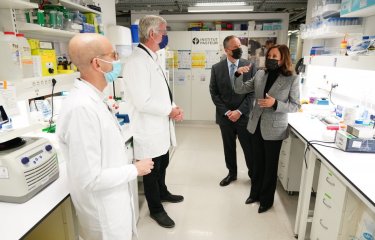Institut Pasteur announces recent advances in the development of one of its candidate vaccines, MV-SARS-CoV-2, using the measles vector, as part of a renewed partnership with CEPI and the companies Thémis and MSD.
With over 100 vaccine projects in development worldwide, the development of a vaccine against SARS CoV-2 infection remains a challenge, with many scientific uncertainties ahead. The timeline and type of candidate vaccine are still unknown at this time. Therefore, every effort must be made to develop different vaccine approaches so that one can be developed as soon as possible.
On March 19, 2020, Institut Pasteur announced that the international coalition CEPI (Coalition for Epidemic Preparedness Innovations) had allocated 4.3 million euros for the first stages of research and development of a vaccine against SARS-CoV-2. This vaccine, MV-SARS-CoV-2 (phase 1 is scheduled to begin later in 2020), takes advantage of the versatile measles virus-based vaccine platform that has emerged from this research.
The development of MV-SARS-CoV-2 is being conducted in partnership with the Austrian biotech company Thémis, which is responsible for the production of preclinical and, clinical batches. Institut Pasteur commends the work and investments made by Thémis since 2012, which have given an industrial development perspective to the measles platform on the basis of which three candidate vaccines against emerging diseases are already in clinical development: against Chikungunya infection, against Zika and against Lassa fever benefiting from funding by CEPI. This type of partnership is essential to enable the transition from research to industrial production.
The acquisition of Thémis by the international pharmaceutical group MSD, one of the world leaders in the field of vaccines, announced today, is a major opportunity for the further development of MV-SARS-CoV-2 and, if successful, for its industrial production and accessibility. Indeed, the large production capacities available to a company of the size of MSD constitute an essential asset, which, if vaccine development is successful, will determine the availability of hundreds of millions of doses as quickly as possible.
The commitment of a company such as MSD to successfully complete this project by investing the considerable resources required to conduct clinical trials and, if necessary, to produce hundreds of millions of doses is a recognition of the quality of this research program initiated by Institut Pasteur and an assurance that its development can be accelerated.
The priority today is research and the fastest possible implementation of clinical trials. This new partnership will make this possible. Tomorrow, the availability of MV- SARS-CoV-2 to all countries based on objective criteria related to medical need will be crucial. Institut Pasteur therefore announces the signing of a memorandum of understanding also involving CEPI and MSD, in which parties agree to equitable access principles designed to ensure global access to the vaccine across country income levels (HICs, MICs, LICs).
"I am delighted that the vaccine technology initially developed at the Institut Pasteur, and enhanced in partnership with Themis and CEPI, will now be leveraged by Merck to prevent and control emerging infectious diseases, notably COVID-19. This is an exciting and impactful development for global public health," commented Prof. Stewart Cole, Director General of Institut Pasteur.
Dr Richard Hatchett, CEO of CEPI said: “These are important developments in the race to develop a vaccine against COVID-19. By broadening the scope of the initial partnership with Institut Pasteur and Themis to include MSD at this stage of the MV-SARS-CoV-2 vaccine candidate development we are bringing the breadth and depth of one of the world’s leading vaccine manufacturers to bear in support of the principles of Access contained in the original agreement.”
Institut Pasteur also announces the renewed partnership with Thémis/MSD to have a vaccine platform that can be mobilized in the event of a new emergence of this type and to accelerate the development of other vaccines against neglected infectious diseases.
Throughout its history, the Institut Pasteur has succeeded in developing both fundamental research programs designed to improve our understanding of living organisms and in making these discoveries available for the benefit of patients in the fields of diagnosis, therapy and, of course, in the extension of the discoveries of its founder, vaccines. The development, in partnership with industrial partners, of the MV-SARS-CoV-2 vaccine is fully in line with this approach and its missions.





